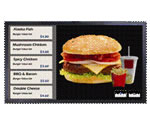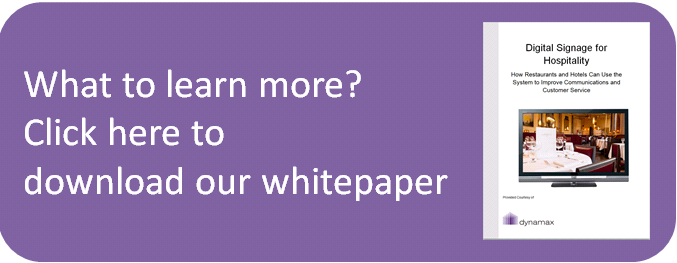 The concept of digital signage in restaurants is not quite a novelty yet it’s definitely far from being a mainstream phenomenon. As Bill Yanckey from DigitalSignageToday puts it” Food can be beautiful” and digital signage helps at marketing it more efficiently.
The concept of digital signage in restaurants is not quite a novelty yet it’s definitely far from being a mainstream phenomenon. As Bill Yanckey from DigitalSignageToday puts it” Food can be beautiful” and digital signage helps at marketing it more efficiently.
Good food should sell itself but for this to happen it needs to be seen. Digital displays enhance the products’ visibility, surpassing the usefulness of static menus and price lists. In the end, the fact of seeing an object has a much stronger impact than just reading about it, a valid statement especially when it comes to culinary products.
Create an enjoyable atmosphere– the 1st step to boost sales.
Digital signage offers the possibility to present the food in a dynamic manner, something that static posters or leaflets can’t do. Showing the food in the making can reassure clients and drive up appetite. Steam rising off a good old Shepherd’s pie can not only induce the desire of having one but also create the right atmosphere clients expect to experience in a restaurant.
Enhance efficiency
This is mainly due to the reduction of the amount of time spent updating information. In a few clicks prices, menus, images can be changed and displayed in almost real time on screens from one or several restaurants.
The cloud aspect of a digital signage software implies that restaurant owners or managers are relieved from the worry of who is managing servers or backing up the data as these issues will be managed by an external company. Because the software is hosted in the cloud (on the internet) its price is much diminished, removing the need of purchasing licences. With less IT expenses incurred, the set up of a digital signage system involves less up-front investments and becomes a quicker, simpler process.
Novelties…
Besides the screens as we know them, another interesting type of display is arising and is quite literally ”under our nose”. The digital caddies– mini screens in serviettes or straw dispensers displayed right on the tables ensure that the restaurant’s message is unmissable yet unobtrusive. The main advantage we see in this device as compared to others is- of course- their location. In this context, the further the message’s medium from the recipients, the lower the chances that it will reach them. The only issue would be securing them down, but this isn’t an unsolvable issue. Other main advantages of the caddies are: no installation works to be done (thus less hassle for the restaurant owners) and the fact that they lend themselves to the use of QR codes (matrix barcodes readable by smartphones, redirecting those scanning them to websites and other resources).
Things to pay attention to:
The choice of hardware- that must be made in accordance with the environment- (proper measures should be taken to protect the screen from heat and grease);
The content- in terms of ROI of a digital signage system, that’s what makes it or breaks it. The effect of a poor content displayed on screens ranges from making the entire project useless to ruining the restaurant’s image. None of these should happen.
The ROI
In a very competitive hospitality industry, digital signage helps restaurateurs differentiate themselves from the crowd, improve communication and customer satisfaction (by reducing the perceived wait time and creating an enjoyable atmosphere) as well as enhance the restaurant’s image, all this with the final result of increasing sales.


